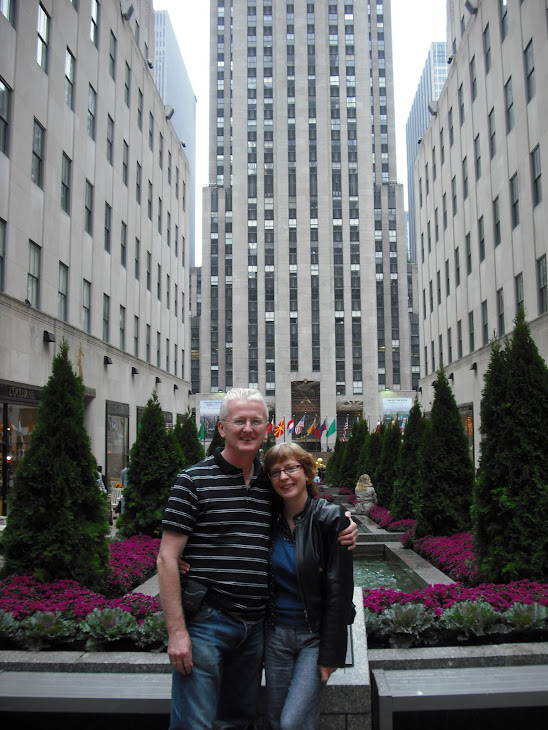Thursday was an important day for us. It's been eight months since our last visit to the Neurologist at King's College Hospital. On Thursday we went back again to see Professor Al-Chalabi. It's a long drive to Denmark Hill from here.
Mrs. Satnav almost let us down and didn't work at all for about fifteen minutes. She managed to recommence operations in time to get me round Hyde Park Corner. Last time that's where I went wrong so I was pleased that today I got in lane and remembered what her rather incomprehensible instructions actually meant. Only one wrong turn later ("Recalculating!"), we made it to the hospital where the parking nightmare begins. We reserve a space but the car park is tiny and the spaces are so narrow it's unbelievable. As I rolled Roch away, I tried not to think about manoeuvring the car out of that spot later.
We had forgotten exactly where the Motor Nerve Clinic was and a volunteer at Reception offered to bring us there. Just as well we were intercepted by Andrew, the LiCals nurse (Lithium Trial) who had been looking out for our arrival. Our volunteer was bringing us in the wrong direction! Andrew said he had been expecting us to arrive with a retinue in tow after the Blog appearance in 'Thumbprint'. I told him we had managed to ditch the paparazzi. We're becoming famous!
It's the last time Roch will need to visit Andrew. As you know, his part in the Trial came to an end some months ago, and since then, he has been on lithium for real and continues to have a blood test every month. Andrew took some blood as the last blood test the Community Nurse did was apparently contaminated. The 'Double-blind' Clinical Trial for lithium has now closed and up to November 30th, they will be collating the information - after that, it will be up to the Statistician, who will ‘uncover the Blind’ and discover who was and was not on Lithium. The results should be published by early next year and if they find that there is a benefit, then I guess we will want Roch to stay on lithium. If the findings show that there is no benefit, then that will be the end of it. We must wait and see.
Andrew brought us over to the Motor Nerve Clinic. I followed him, pushing Roch in the wheelchair, along corridors, around corners and finally as Andrew came to a halt outside an open doorway, I glanced in and saw several people in wheelchairs, waiting. I had been about to go on, past the door, when with a shock, I remembered - that's where we belong. We said good-bye to Andrew and I lined Roch up beside the other wheelchair-bound patients. How strange that glancing inside, I didn't connect him with them. It didn't seem to have anything to do with us.
Before we saw Professor Al-Chalabi, a nurse measured Roch’s lung capacity. 100%. A brilliant reading. This was cheering and a good start. It wasn’t long before the Professor himself came to bring us to the consulting room.
He draws his chair in close to Roch, maintaining eye contact, listening carefully to what he has to say and answering all his questions in a kind but professional way. He is always straight with us. He is mindful of Roch's feelings but he knows that Roch wants the truth.
The results of the second EMG test carried out back in April by Professor Mills has proved without doubt that Roch does have MND. Prof Al-Chalabi had wanted to be sure as there were some anomalies. Just as well we had not allowed ourselves to hope. I don’t think either of us had any doubt about the outcome.
Roch asked him about the dosage of baclofen, which is 15mg a day. Baclofen is prescribed for spacicity. Roch feels his arms are being affected and that this is what prevents him from driving. He feels the baclofen is not making much of a difference and wondered if the dosage was correct. Unfortunately Professor Al-Chalabi confirmed what I had suspected - that the problem with his arms and driving is due more to increased muscle weakness than to spacicity and there's nothing we can do about that. No amount of baclofen will help.
We re-visited Roch's fear that the slow progression of his condition will continue in the later stages. He fears a long period of decrepitude. He told Professor Al-Chalabi that he feels he is decrepit now. Professor Al-Chalabi was surprised and said as much. He said that to him, Roch did not look decrepit. He did say that of course it was Roch's perception of himself that was important but he himself would have described Roch's present condition as being 'mightily inconvenienced' rather than decrepit! He is pleased that the disease is progressing at such a slow rate and is cautiously optimistic about extending life expectancy. But for Roch, it's a double-edged sword.
He was, as ever, quite straight with us and made no attempt to sugar the pill. He confirmed that the disease will progress at the same rate throughout. This is confirming Roch’s worst fears. We should expect that having enjoyed the benefits of a slow progression he will also have to endure the hardship of a slow decline. This was hard to hear. Roch told him that already he is a burden! Professor Al-Chalabi said that the reality of the disease is that one becomes a burden and he just has to accept that. I guess this is true - but as I told Roch afterwards, he may feel that he is a burden but really, it's up to me to say whether he is a burden or not. I hope I never make him feel like a burden. If I do, I don't meant to. But neither of us looks forward to a bleak future of prolonged decrepitude for him.
We are mightily inconvenienced.
Subscribe to:
Post Comments (Atom)


No comments:
Post a Comment